VOICE: Plant Science [No. 025] Neriza Nobleza Galasさん(植物病理学分野 博士後期課程2年)
植物生命科学コースの学生・卒業生/修了生・教員の声をお届けするインタビュー記事です。月一回くらいの頻度で更新予定です。→記事一覧はこちら
Today we invited Neriza Nobleza Galas to the “VOICE Plant Science” interview. She is a PhD student in the lab of plant pathology.
(今回は、植物病理学分野 博士後期課程2年のNeriza Nobleza Galasさんにお話を伺います。)
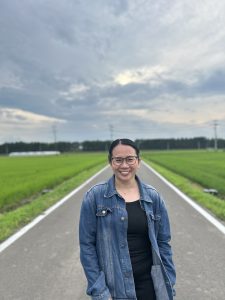 Neriza Nobleza Galas (PhD student at the Lab of plant pathology)
Neriza Nobleza Galas (PhD student at the Lab of plant pathology)
Neriza Nobleza Galasさん(植物病理分野 博士後期課程2年)
Shuhei Miyashita (interviewer):
Hi, Neriza. Thank you for coming. Could you please tell us why you decided to come to Tohoku University from the Philippines and explain about the MEXT scholarship you currently receive?
(Nerizaさん、今日はお越しいただきありがとうございます。はじめに、フィリピンから東北大学に来ることにした理由と、現在受給している文科省の国費外国人留学生奨学金について紹介いただけますか。)
Neriza Nobleza Galas:
As part of the MEXT application process, I had to choose a university where I wanted to pursue my PhD. Tohoku University (TU) was one of my options, and while applying, I learned that TU is one of the best national universities in Japan. I also considered the cost of living in the area where I want to study. Studying in the best university was a win-win decision while saving money from the scholarship stipend. As a PhD student, I have three years to enjoy the scholarship. The MEXT scholarship covers the tuition fee, including a monthly stipend for dorm rentals and personal expenses. The monthly allowance is more than enough if you live within the budget.
(国費外国人留学生制度で日本に留学しようと考え、その候補の一つとして東北大学について調べ、日本で最高の国立大学の一つであることを知りました。地域による生活費の違いについても考慮しました。最高の大学で学ぶことと、節約した生活を両立できるのが東北大学でした。博士後期課程学生として、3年間の奨学金を受給します。授業料が免除され、ドミトリーの費用と生活費を賄うのに十分な奨学金をいただいています。)
Shuhei:
What are your impressions of Japan so far?
(日本に住んでみて、印象はどうですか?)
Neriza:
I genuinely enjoy being here. I am amazed by the train schedules; they are mostly on time. I also love the clean environment and how helpful Japanese people are. During my first few months here, I had several experiences where I asked for directions, and despite the language barrier, Japanese people went the extra mile to help me. Above all, I love Japanese food.
(本当に楽しんでいます。まずは電車がほぼ時間通りに来ることが驚きです。街が清潔なのと、皆さん親切なのもありがたいです。来た当初は道がわからないこともありましたが、通りがかりの人に聞くとわざわざ一緒についてきて案内してくれたことが何度もありました。それに何といっても、日本の食べ物が大好きです!)
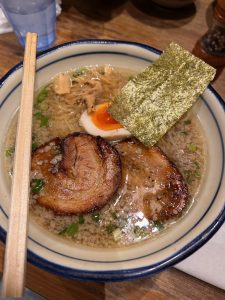 Photo: Ramen is my go-to Japanese food. I crave a bowl of ramen when I am stressed or feel weak. It feels like there’s nothing that a bowl of ramen can’t fix. =)
Photo: Ramen is my go-to Japanese food. I crave a bowl of ramen when I am stressed or feel weak. It feels like there’s nothing that a bowl of ramen can’t fix. =)
(ラーメンは間違いない。心と体がラーメンを欲するのは、ストレスを感じたときや弱ったとき。ラーメンがあれば全部大丈夫!)
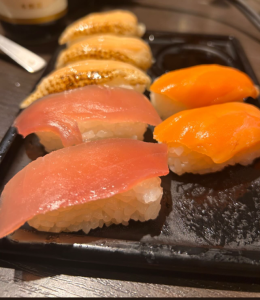 Photo: I love sushi; it is one of my favorite foods. But when I first tried sushi here in Japan, I loved it even more. The freshness of the seafood is different, which enhances its flavor. It also surprised me that the sushi from the convenience store tasted good.
Photo: I love sushi; it is one of my favorite foods. But when I first tried sushi here in Japan, I loved it even more. The freshness of the seafood is different, which enhances its flavor. It also surprised me that the sushi from the convenience store tasted good.
(お寿司も大好きで、お気に入りの一つ。日本に来る前も食べていたけれど、日本で食べてもっと好きになった。魚介の新鮮さが違うから、味わいが格別。コンビニのお寿司が結構イケるのにもびっくり)
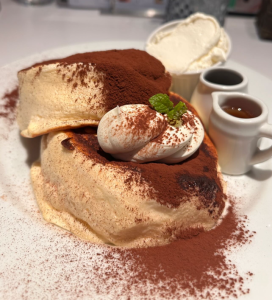 Photo: I have added the Japanese souffle pancake to my list. I love its light texture and softness. It’s fluffier and more delicious than I imagined. It is way different from typical pancakes.
Photo: I have added the Japanese souffle pancake to my list. I love its light texture and softness. It’s fluffier and more delicious than I imagined. It is way different from typical pancakes.
(日本のスフレもお気に入りに追加済み。軽くて柔らかい食感がたまらない。想像を超えるフワフワとおいしさ。ただのパンケーキとは一緒にしないで)
Shuhei:
It seems you are trying to make me hungry. Could you please explain your current research project briefly?
(聞いているとお腹が減りますね。現在の研究について簡単に紹介いただけますか。)
Neriza:
I’m studying on jumbophages that can lyse and kill plant pathogenic bacteria. Jumbophages are phages with DNA genomes larger than 200 kbp, and can infect a broader range of bacteria than ordinary phages. Previous studies in our lab showed that jumbophages isolated from leaf litter compost can suppress tomato wilt caused by Ralstonia pseudosolanaceae and rice seedling rot caused by Burkholderia glumae. In my PhD study, I’m using these phages to explore whether jumbophages can quickly adapt to new bacterial host by modulating their infectivity through evolution, in order to reveal the general mechanism of the broad host range of jumbophages. I use experimental evolution approach: each phage is repeatedly inoculated to different bacteria with varying levels of susceptibility as “new hosts”. If adaption occurs, the progeny phages will acquire increased infectivity to the new host bacteria. Genome sequencing of the progeny phages will also be performed to identify gene mutations linked to adaptation, shedding light on the genetic basis of host range plasticity of jumbophages.
(植物病原細菌を溶菌して殺すジャンボファージについて研究しています。ジャンボファージは20万塩基対以上のDNAをゲノムとするファージで、それより小さい「普通の」ファージより多くの細菌に感染できます。研究室では、Ralstonia pseudosolanaceaeとBurkholderia glumaeが引き起こすトマト青枯れ病やイネもみ枯れ細菌病を抑制できるジャンボファージが落葉堆肥から単離されています。私の研究では、これらのジャンボファージを使って、ジャンボファージが進化によって新しい宿主細菌に迅速に適応しうるか、明らかにしようとしています。これによって、ジャンボファージが広い宿主範囲を持つ仕組みを明らかにすることが狙いです。具体的には、実験進化を行っています。それぞれのジャンボファージを感受性の異なる細菌に繰り返し接種して子孫ファージを得ます。もし適応が起こると、新しい宿主細菌に対する感染性が上がるはずです。得られた子孫ファージは全ゲノム塩基配列の解析を行い、適応に寄与した変異を同定します。このようにして、ジャンボファージの宿主範囲の可塑性と遺伝的背景を関連付けます。
 Figure: Experimental evolution of jumbophages in “new hosts”.
Figure: Experimental evolution of jumbophages in “new hosts”.
(ジャンボファージの「新しい宿主」における実験進化)
Shuhei:
Thank you! I hope your project will be successful. By the way, why did you choose “plant science,” or, more specifically, “plant pathology” as your major?
(是非、いい成果を出してください。ところで、そもそも植物科学あるいは、より具体的に植物病理学を選んだ理由はどんなものですか。)
Neriza:
I reside in an area known for agriculture, but only a few students are taking up plant pathology. I considered the job opportunity of my course, and I enjoyed working in the laboratory. When my late uncle explained what a plant pathologist does, I was convinced to pursue it.
(農業が盛んな地域にいたのですが、植物病理学を学ぶ学生はあまりいなかったので、必要とされる職業だと思ったのと、実験が好きだったからです。いまは亡くなっていますが伯父から植物病理学者の仕事について聞き、それに決めました。)
Shuhei:
I see. I remember you did your master’s study in Belgium. What do you think are the good things and difficulties of studying abroad?
(そうだったんですね。修士課程はベルギーで過ごされたと記憶しています。母国を離れて学ぶことの利点と、難しさについて聞かせてもらえますか。)
Neriza:
Studying abroad has both positive and challenging aspects. My learning experience was limited during college due to academic facilities and equipment scarcity. However, when I studied abroad, I had the opportunity to perform laboratory protocols using fancy equipment for the first time, which I had only heard about from my professors back home. Additionally, it is very exciting to learn about different cultures, explore new places, and try foreign dishes. I also enjoy meeting people from various cultural backgrounds. On the other hand, one of the most challenging parts of studying abroad is the sense of not belonging and the struggle to fit in. There are moments when homesickness sets in, and I miss my family. I am grateful for technology, which allows me to talk to my family virtually anytime.
(そうですね、よい面と大変な面の両方がありますね。母国での大学時代は設備や機器が不十分で、経験できることが限られていました。当時そうやって講義で聞いたことがあるだけだった実験を、実際にやる機会が得られたのは良いことです。また、異なる文化を知ることや知らない場所に行ってみること、異国の料理を食べてみることはとても刺激的な経験です。文化的背景の異なる人々と触れ合うことも楽しんでいます。一方で、大変な側面としては、根無し草のように感じることや、その場に溶け込むために必要な努力が挙げられます。ホームシックになって家族に会いたくなることもあります。でも技術の進歩のおかげで、いつでも家族とオンラインで会えるのはありがたいですね。)
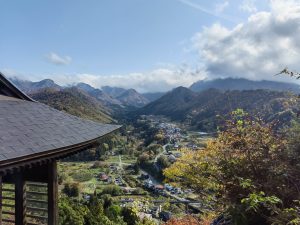 Photo: I went to Yamadera during my first weeks here in Japan. I fell in love with the place. Since I visited during autumn, I loved the vibrant colors of nature.
Photo: I went to Yamadera during my first weeks here in Japan. I fell in love with the place. Since I visited during autumn, I loved the vibrant colors of nature.
(日本に来て最初の週に訪れた山寺は、本当に好きになった場所。季節は秋で、色鮮やかな自然の美しさに魅了されました。)
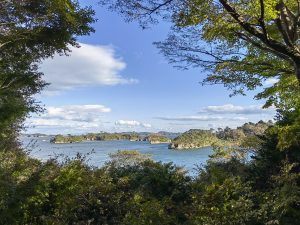 Photo: I certainly love the sea. Aside from the scenic views, I enjoyed the unlimited oyster in Matsushima. It was one for the books.
Photo: I certainly love the sea. Aside from the scenic views, I enjoyed the unlimited oyster in Matsushima. It was one for the books.
(海も間違いなく好き。景色もそうだけど、松島の牡蠣の食べ放題もよかった。絶対おすすめ)
Shuhei:
Yeah, studying abroad makes us stronger and thoughtful; and it’s nice to know that Japanese dishes are helping you a lot. Could you illustrate the current agricultural situation in the Philippines?
(そうですね、母国を離れて学ぶことで強く、思慮深くなれる気がします。日本の食があなたを支えていることも嬉しく思います。フィリピンの農業の現状について教えてくれますか。)
Neriza:
Agriculture serves as the backbone of the Philippine economy. Renowned for its exports of bananas and pineapples to neighboring Asian countries, the agricultural sector has become more adaptive to modern technologies to enhance crop growth compared to previous practices. Nowadays, farmers are becoming more environmentally conscious when it comes to pest management. They are exploring biological control methods to combat plant disease and insect infestations. However, due to its geographical location, the Philippines experiences more than 20 typhoons annually, which makes agriculture even more challenging in some regions.
(農業はフィリピン経済の柱です。バナナとパイナップルのアジア諸国への輸出はよく知られていますし、より現代的な技術が農業分野び取り入れられ、従来よりも収量が上がっています。最近では農家は病害防除の際に環境への負荷を考慮するようになってきました。生物的防除により病害や虫害を抑える試みもなされています。ただ、年に20回も台風が来る国なので、地域によってはその大変さもあります。)
Shuhei:
True. I suppose that bacterial diseases are more serious in such a situation because the pathogens can splatter from soil. This is the last question: what would be your future mission as a researcher?
(たしかに台風は大変ですね。土壌中の病原細菌がまき上げられるので細菌病がやっかいでしょうね。さて、これが最後の質問です。研究者として将来なにをすべきとお考えですか。)
Neriza:
To my knowledge, no one in the Philippines studies bacteriophages and their huge potential in controlling plant diseases. I am interested in continuing my research, especially in my region, where significant crops are produced. It would be interesting to isolate and use phages to control some plant diseases that infect rice, corn, bananas, and more. This type of research is like hitting two birds with one stone. It will help augment the income of the farmers while preserving the environment.
(私の知る限りフィリピンでは植物病原細菌の防除にファージを用いるような研究はなされていません。フィリピン、とりわけ故郷の農業が盛んな地域でファージの研究を続けたいと思います。イネ、トウモロコシ、バナナといった作物の病気をファージで抑えられれば嬉しいですね。ファージの研究のいいところは一石二鳥、つまり農家の収入の助けになる上に、環境にも優しいということだと思います。)
Shuhei:
I agree with you. I hope your bacteriophage study will be applied in the Philippines and that the collaborations between your institute and Tohoku University will be continued. I think this is an important goal of the MEXT scholarship. Thank you so much for coming today.
(そうですね。ファージの研究がフィリピンで応用されること、また、Nerizaさんの所属機関と東北大との共同研究が継続的に行われることを期待します。それは、文科省の国費外国人留学生制度が目指すゴールの一つと言えるでしょう。今日はどうもありがとうございました。)



